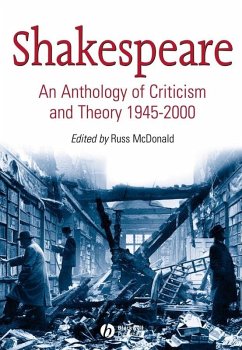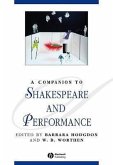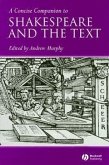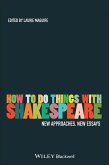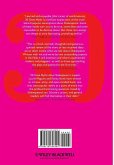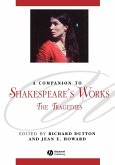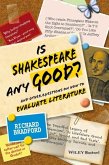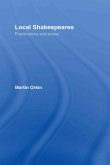Russ McDonald (ed.)An Anthology of Criticism and Theory 1945-2000
Shakespeare
An Anthology of Criticism and Theory 1945-2000
Herausgeber: Mcdonald, Russ
Russ McDonald (ed.)An Anthology of Criticism and Theory 1945-2000
Shakespeare
An Anthology of Criticism and Theory 1945-2000
Herausgeber: Mcdonald, Russ
- Gebundenes Buch
- Merkliste
- Auf die Merkliste
- Bewerten Bewerten
- Teilen
- Produkt teilen
- Produkterinnerung
- Produkterinnerung
Shakespeare: An Anthology of Criticism and Theory 1945-2000 contains many of the most significant essays and book chapters published on Shakespeare in the second half of the twentieth century. It introduces students of Shakespeare to the variety of theoretical positions, thematic claims, methodologies, and modes of argument that have contributed to the current critical landscape. The collection consists of 49 essays written by a broad range of authors, from E. M. W. Tillyard and William Empson, who represent old-style historicism and a version of New Criticism respectively, to Stephen…mehr
Andere Kunden interessierten sich auch für
![A Companion to Shakespeare and Performance A Companion to Shakespeare and Performance]() Barbara HodgdonA Companion to Shakespeare and Performance279,99 €
Barbara HodgdonA Companion to Shakespeare and Performance279,99 €![A Concise Companion to Shakespeare and the Text A Concise Companion to Shakespeare and the Text]() Andrew MurphyA Concise Companion to Shakespeare and the Text156,99 €
Andrew MurphyA Concise Companion to Shakespeare and the Text156,99 €![How to Do Things with Shakespeare How to Do Things with Shakespeare]() MaguireHow to Do Things with Shakespeare47,99 €
MaguireHow to Do Things with Shakespeare47,99 €![30 Great Myths about Shakespeare 30 Great Myths about Shakespeare]() Laurie Maguire30 Great Myths about Shakespeare104,99 €
Laurie Maguire30 Great Myths about Shakespeare104,99 €![A Companion to Shakespeare's Works, Volume I A Companion to Shakespeare's Works, Volume I]() DUTTON RICHARD / Howard JeanA Companion to Shakespeare's Works, Volume I69,99 €
DUTTON RICHARD / Howard JeanA Companion to Shakespeare's Works, Volume I69,99 €![Is Shakespeare Any Good? Is Shakespeare Any Good?]() Richard BradfordIs Shakespeare Any Good?86,99 €
Richard BradfordIs Shakespeare Any Good?86,99 €![Local Shakespeares Local Shakespeares]() Martin OrkinLocal Shakespeares131,99 €
Martin OrkinLocal Shakespeares131,99 €-
-
-
Shakespeare: An Anthology of Criticism and Theory 1945-2000 contains many of the most significant essays and book chapters published on Shakespeare in the second half of the twentieth century. It introduces students of Shakespeare to the variety of theoretical positions, thematic claims, methodologies, and modes of argument that have contributed to the current critical landscape. The collection consists of 49 essays written by a broad range of authors, from E. M. W. Tillyard and William Empson, who represent old-style historicism and a version of New Criticism respectively, to Stephen Greenblatt and Catherine Belsey, who respond to and refute the insights of their predecessors. The essays are organized into categories of critical thought and introduced in clear and accessible language. Taken together, they chronicle a particularly stimulating period in the history of literary study.
Hinweis: Dieser Artikel kann nur an eine deutsche Lieferadresse ausgeliefert werden.
Hinweis: Dieser Artikel kann nur an eine deutsche Lieferadresse ausgeliefert werden.
Produktdetails
- Produktdetails
- Verlag: Wiley
- Seitenzahl: 952
- Erscheinungstermin: 30. Januar 2004
- Englisch
- Abmessung: 260mm x 189mm x 54mm
- Gewicht: 1729g
- ISBN-13: 9780631234876
- ISBN-10: 063123487X
- Artikelnr.: 21196427
- Herstellerkennzeichnung
- Libri GmbH
- Europaallee 1
- 36244 Bad Hersfeld
- gpsr@libri.de
- Verlag: Wiley
- Seitenzahl: 952
- Erscheinungstermin: 30. Januar 2004
- Englisch
- Abmessung: 260mm x 189mm x 54mm
- Gewicht: 1729g
- ISBN-13: 9780631234876
- ISBN-10: 063123487X
- Artikelnr.: 21196427
- Herstellerkennzeichnung
- Libri GmbH
- Europaallee 1
- 36244 Bad Hersfeld
- gpsr@libri.de
Russ McDonald is Professor of English at the University of North Carolina at Greensboro. He has written extensively on Shakespeare and early modern literature and culture, most recently in Shakespeare and the Art of Language (2001) and The Bedford Companion to Shakespeare (Second Edition, 2001).
Introduction.
Acknowledgements.
1. Authorship.
Looney And The Oxfordians. (S. Schoenbaum).
2. New Criticism.
The Naked Babe And The Cloak Of Manliness. (Cleanth Brooks).
'Honest' In Othello. William Empson.
'Introductory' Chapter About The Tragedies. (Wolfgang Clemen).
The 'New Criticism' And 'King Lear'. (William R. Keast).
3. Dramatic Kinds.
The Argument Of Comedy. (Northrop Frye).
Ambivalence: The Dialectic Of The Histories. (A.P Rossiter).
Introduction: The Saturnalian Pattern. (C. L. Barber).
The Jacobean Shakespeare. (Maynard Mack).
4. THE 1950s and '60s: Structure, Theme, Character.
Reflections On The Sentimentalist's Othello. (Barbara Everett).
Form And Formality In Romeo And Juliet. (Harry Levin).
King Lear Or Endgame. (Jan Kott).
The Cheapening Of The Stage. (Anne Righter).
How Not To Murder Caesar. (Sigurd Burckhardt).
5. Reader-Response Criticism.
On The Value Of Hamlet. (Stephen Booth).
Rabbits, Ducks, And (Henry V. Norman Rabkin).
6. Textual Criticism And Bibliography.
The New Textual Criticism Of Shakespeare. (Fredson Bowers).
Revising Shakespeare. Gary Taylor.
Narratives About Printed Shakespeare Texts: 'Foul Papers' And 'Bad
Quartos'. (Paul Werstine).
7. Psychoanalytic Readings.
'Anger's My Meat': Feeding, Dependency, And Aggression In Coriolanus.
(Janet Adelman).
The Avoidance Of Love: A Reading Of King Lear. (Stanley Cavell).
To Entrap The Wisest: Sacrificial Ambivalence In The Merchant Of Venice And
Richard III. (Rene Girard).
What Did The King Know And When Did He Know It? Shakespearean Discourses
And Psychoanalysis. (Harry Berger, Jr).
The Turn Of The Shrew. (Joel Fineman).
8. Historicism And New Historicism.
Introductory: The Cosmic Background. (E.M.W. Tillyard).
Invisible Bullets: Renaissance Authority And Its Subversion, Henry IV And
(Henry V. Stephen Greenblatt).
The New Historicism In Renaissance Studies. (Jean Howard).
Shaping Fantasies: Figurations Of Gender And Power In Elizabethan Culture.
(Louis Adrian Montrose).
9. Materialist Criticism.
Tradition And Experiment. (Robert Weimann).
Radical Tragedy. (Jonathan Dollimore).
Give An Account Of Shakespeare And Education, Showing Why You Think They
Are Effective And What You Have Appreciated About Them; Support Your
Comments With Precise References. (Alan Sinfield).
10. Feminist Criticism.
Egyptian Queens And Male Reviewers. (Linda Woodbridge).
'I Wooed Thee With My Sword': Shakespeare's Tragic Paradigms. (Madelon
Gohlke).
The Family In Shakespeare Studies; Or-Studies In The Family Of
Shakespeareans; Or-The Politics Of Politics. (Lynda E. Boose).
Disrupting Sexual Difference. (Catherine Belsey).
11. Studies In Gender And Sexuality.
'This That You Call Love': Sexual And Social Tragedy In Othello. (Gayle
Greene).
The Performance Of Desire. (Stephen Orgel).
The Secret Sharer. (Bruce Smith).
The Homoerotics Of Comedy. (Valerie Traub).
12. Performance Criticism.
Shakespeare And The Blackfriars Theatre. (Gerald Eades Bentley).
Conclusion: The Critical Revolution. (J.L. Styan).
William Shakespeare's Romeo + Juliet: Everything's Nice In America?
(Barbara Hodgdon).
Deeper Meanings And Theatrical Technique: The Rhetoric Of Performance
Criticism. (William Worthen).
13. Race And Postcolonialism.
'Nymphs And Reapers Heavily Vanish': The Discursive Con-Texts Of The
Tempest. Francis Barker And Peter Hulme.
Sexuality And Racial Difference. (Ania Loomba).
Discourse And The Individual: The Case Of Colonialism In The Tempest.
(Meredith Anne Skura).
14. Reading Closely.
Shakespeare's Prose. (Jonas Barish).
The Play Of Phrase And Line. (George T. Wright).
Transfigurations: Shakespeare And Rhetoric. (Patricia Parker).
Index
Acknowledgements.
1. Authorship.
Looney And The Oxfordians. (S. Schoenbaum).
2. New Criticism.
The Naked Babe And The Cloak Of Manliness. (Cleanth Brooks).
'Honest' In Othello. William Empson.
'Introductory' Chapter About The Tragedies. (Wolfgang Clemen).
The 'New Criticism' And 'King Lear'. (William R. Keast).
3. Dramatic Kinds.
The Argument Of Comedy. (Northrop Frye).
Ambivalence: The Dialectic Of The Histories. (A.P Rossiter).
Introduction: The Saturnalian Pattern. (C. L. Barber).
The Jacobean Shakespeare. (Maynard Mack).
4. THE 1950s and '60s: Structure, Theme, Character.
Reflections On The Sentimentalist's Othello. (Barbara Everett).
Form And Formality In Romeo And Juliet. (Harry Levin).
King Lear Or Endgame. (Jan Kott).
The Cheapening Of The Stage. (Anne Righter).
How Not To Murder Caesar. (Sigurd Burckhardt).
5. Reader-Response Criticism.
On The Value Of Hamlet. (Stephen Booth).
Rabbits, Ducks, And (Henry V. Norman Rabkin).
6. Textual Criticism And Bibliography.
The New Textual Criticism Of Shakespeare. (Fredson Bowers).
Revising Shakespeare. Gary Taylor.
Narratives About Printed Shakespeare Texts: 'Foul Papers' And 'Bad
Quartos'. (Paul Werstine).
7. Psychoanalytic Readings.
'Anger's My Meat': Feeding, Dependency, And Aggression In Coriolanus.
(Janet Adelman).
The Avoidance Of Love: A Reading Of King Lear. (Stanley Cavell).
To Entrap The Wisest: Sacrificial Ambivalence In The Merchant Of Venice And
Richard III. (Rene Girard).
What Did The King Know And When Did He Know It? Shakespearean Discourses
And Psychoanalysis. (Harry Berger, Jr).
The Turn Of The Shrew. (Joel Fineman).
8. Historicism And New Historicism.
Introductory: The Cosmic Background. (E.M.W. Tillyard).
Invisible Bullets: Renaissance Authority And Its Subversion, Henry IV And
(Henry V. Stephen Greenblatt).
The New Historicism In Renaissance Studies. (Jean Howard).
Shaping Fantasies: Figurations Of Gender And Power In Elizabethan Culture.
(Louis Adrian Montrose).
9. Materialist Criticism.
Tradition And Experiment. (Robert Weimann).
Radical Tragedy. (Jonathan Dollimore).
Give An Account Of Shakespeare And Education, Showing Why You Think They
Are Effective And What You Have Appreciated About Them; Support Your
Comments With Precise References. (Alan Sinfield).
10. Feminist Criticism.
Egyptian Queens And Male Reviewers. (Linda Woodbridge).
'I Wooed Thee With My Sword': Shakespeare's Tragic Paradigms. (Madelon
Gohlke).
The Family In Shakespeare Studies; Or-Studies In The Family Of
Shakespeareans; Or-The Politics Of Politics. (Lynda E. Boose).
Disrupting Sexual Difference. (Catherine Belsey).
11. Studies In Gender And Sexuality.
'This That You Call Love': Sexual And Social Tragedy In Othello. (Gayle
Greene).
The Performance Of Desire. (Stephen Orgel).
The Secret Sharer. (Bruce Smith).
The Homoerotics Of Comedy. (Valerie Traub).
12. Performance Criticism.
Shakespeare And The Blackfriars Theatre. (Gerald Eades Bentley).
Conclusion: The Critical Revolution. (J.L. Styan).
William Shakespeare's Romeo + Juliet: Everything's Nice In America?
(Barbara Hodgdon).
Deeper Meanings And Theatrical Technique: The Rhetoric Of Performance
Criticism. (William Worthen).
13. Race And Postcolonialism.
'Nymphs And Reapers Heavily Vanish': The Discursive Con-Texts Of The
Tempest. Francis Barker And Peter Hulme.
Sexuality And Racial Difference. (Ania Loomba).
Discourse And The Individual: The Case Of Colonialism In The Tempest.
(Meredith Anne Skura).
14. Reading Closely.
Shakespeare's Prose. (Jonas Barish).
The Play Of Phrase And Line. (George T. Wright).
Transfigurations: Shakespeare And Rhetoric. (Patricia Parker).
Index
Introduction.
Acknowledgements.
1. Authorship.
Looney And The Oxfordians. (S. Schoenbaum).
2. New Criticism.
The Naked Babe And The Cloak Of Manliness. (Cleanth Brooks).
'Honest' In Othello. William Empson.
'Introductory' Chapter About The Tragedies. (Wolfgang Clemen).
The 'New Criticism' And 'King Lear'. (William R. Keast).
3. Dramatic Kinds.
The Argument Of Comedy. (Northrop Frye).
Ambivalence: The Dialectic Of The Histories. (A.P Rossiter).
Introduction: The Saturnalian Pattern. (C. L. Barber).
The Jacobean Shakespeare. (Maynard Mack).
4. THE 1950s and '60s: Structure, Theme, Character.
Reflections On The Sentimentalist's Othello. (Barbara Everett).
Form And Formality In Romeo And Juliet. (Harry Levin).
King Lear Or Endgame. (Jan Kott).
The Cheapening Of The Stage. (Anne Righter).
How Not To Murder Caesar. (Sigurd Burckhardt).
5. Reader-Response Criticism.
On The Value Of Hamlet. (Stephen Booth).
Rabbits, Ducks, And (Henry V. Norman Rabkin).
6. Textual Criticism And Bibliography.
The New Textual Criticism Of Shakespeare. (Fredson Bowers).
Revising Shakespeare. Gary Taylor.
Narratives About Printed Shakespeare Texts: 'Foul Papers' And 'Bad
Quartos'. (Paul Werstine).
7. Psychoanalytic Readings.
'Anger's My Meat': Feeding, Dependency, And Aggression In Coriolanus.
(Janet Adelman).
The Avoidance Of Love: A Reading Of King Lear. (Stanley Cavell).
To Entrap The Wisest: Sacrificial Ambivalence In The Merchant Of Venice And
Richard III. (Rene Girard).
What Did The King Know And When Did He Know It? Shakespearean Discourses
And Psychoanalysis. (Harry Berger, Jr).
The Turn Of The Shrew. (Joel Fineman).
8. Historicism And New Historicism.
Introductory: The Cosmic Background. (E.M.W. Tillyard).
Invisible Bullets: Renaissance Authority And Its Subversion, Henry IV And
(Henry V. Stephen Greenblatt).
The New Historicism In Renaissance Studies. (Jean Howard).
Shaping Fantasies: Figurations Of Gender And Power In Elizabethan Culture.
(Louis Adrian Montrose).
9. Materialist Criticism.
Tradition And Experiment. (Robert Weimann).
Radical Tragedy. (Jonathan Dollimore).
Give An Account Of Shakespeare And Education, Showing Why You Think They
Are Effective And What You Have Appreciated About Them; Support Your
Comments With Precise References. (Alan Sinfield).
10. Feminist Criticism.
Egyptian Queens And Male Reviewers. (Linda Woodbridge).
'I Wooed Thee With My Sword': Shakespeare's Tragic Paradigms. (Madelon
Gohlke).
The Family In Shakespeare Studies; Or-Studies In The Family Of
Shakespeareans; Or-The Politics Of Politics. (Lynda E. Boose).
Disrupting Sexual Difference. (Catherine Belsey).
11. Studies In Gender And Sexuality.
'This That You Call Love': Sexual And Social Tragedy In Othello. (Gayle
Greene).
The Performance Of Desire. (Stephen Orgel).
The Secret Sharer. (Bruce Smith).
The Homoerotics Of Comedy. (Valerie Traub).
12. Performance Criticism.
Shakespeare And The Blackfriars Theatre. (Gerald Eades Bentley).
Conclusion: The Critical Revolution. (J.L. Styan).
William Shakespeare's Romeo + Juliet: Everything's Nice In America?
(Barbara Hodgdon).
Deeper Meanings And Theatrical Technique: The Rhetoric Of Performance
Criticism. (William Worthen).
13. Race And Postcolonialism.
'Nymphs And Reapers Heavily Vanish': The Discursive Con-Texts Of The
Tempest. Francis Barker And Peter Hulme.
Sexuality And Racial Difference. (Ania Loomba).
Discourse And The Individual: The Case Of Colonialism In The Tempest.
(Meredith Anne Skura).
14. Reading Closely.
Shakespeare's Prose. (Jonas Barish).
The Play Of Phrase And Line. (George T. Wright).
Transfigurations: Shakespeare And Rhetoric. (Patricia Parker).
Index
Acknowledgements.
1. Authorship.
Looney And The Oxfordians. (S. Schoenbaum).
2. New Criticism.
The Naked Babe And The Cloak Of Manliness. (Cleanth Brooks).
'Honest' In Othello. William Empson.
'Introductory' Chapter About The Tragedies. (Wolfgang Clemen).
The 'New Criticism' And 'King Lear'. (William R. Keast).
3. Dramatic Kinds.
The Argument Of Comedy. (Northrop Frye).
Ambivalence: The Dialectic Of The Histories. (A.P Rossiter).
Introduction: The Saturnalian Pattern. (C. L. Barber).
The Jacobean Shakespeare. (Maynard Mack).
4. THE 1950s and '60s: Structure, Theme, Character.
Reflections On The Sentimentalist's Othello. (Barbara Everett).
Form And Formality In Romeo And Juliet. (Harry Levin).
King Lear Or Endgame. (Jan Kott).
The Cheapening Of The Stage. (Anne Righter).
How Not To Murder Caesar. (Sigurd Burckhardt).
5. Reader-Response Criticism.
On The Value Of Hamlet. (Stephen Booth).
Rabbits, Ducks, And (Henry V. Norman Rabkin).
6. Textual Criticism And Bibliography.
The New Textual Criticism Of Shakespeare. (Fredson Bowers).
Revising Shakespeare. Gary Taylor.
Narratives About Printed Shakespeare Texts: 'Foul Papers' And 'Bad
Quartos'. (Paul Werstine).
7. Psychoanalytic Readings.
'Anger's My Meat': Feeding, Dependency, And Aggression In Coriolanus.
(Janet Adelman).
The Avoidance Of Love: A Reading Of King Lear. (Stanley Cavell).
To Entrap The Wisest: Sacrificial Ambivalence In The Merchant Of Venice And
Richard III. (Rene Girard).
What Did The King Know And When Did He Know It? Shakespearean Discourses
And Psychoanalysis. (Harry Berger, Jr).
The Turn Of The Shrew. (Joel Fineman).
8. Historicism And New Historicism.
Introductory: The Cosmic Background. (E.M.W. Tillyard).
Invisible Bullets: Renaissance Authority And Its Subversion, Henry IV And
(Henry V. Stephen Greenblatt).
The New Historicism In Renaissance Studies. (Jean Howard).
Shaping Fantasies: Figurations Of Gender And Power In Elizabethan Culture.
(Louis Adrian Montrose).
9. Materialist Criticism.
Tradition And Experiment. (Robert Weimann).
Radical Tragedy. (Jonathan Dollimore).
Give An Account Of Shakespeare And Education, Showing Why You Think They
Are Effective And What You Have Appreciated About Them; Support Your
Comments With Precise References. (Alan Sinfield).
10. Feminist Criticism.
Egyptian Queens And Male Reviewers. (Linda Woodbridge).
'I Wooed Thee With My Sword': Shakespeare's Tragic Paradigms. (Madelon
Gohlke).
The Family In Shakespeare Studies; Or-Studies In The Family Of
Shakespeareans; Or-The Politics Of Politics. (Lynda E. Boose).
Disrupting Sexual Difference. (Catherine Belsey).
11. Studies In Gender And Sexuality.
'This That You Call Love': Sexual And Social Tragedy In Othello. (Gayle
Greene).
The Performance Of Desire. (Stephen Orgel).
The Secret Sharer. (Bruce Smith).
The Homoerotics Of Comedy. (Valerie Traub).
12. Performance Criticism.
Shakespeare And The Blackfriars Theatre. (Gerald Eades Bentley).
Conclusion: The Critical Revolution. (J.L. Styan).
William Shakespeare's Romeo + Juliet: Everything's Nice In America?
(Barbara Hodgdon).
Deeper Meanings And Theatrical Technique: The Rhetoric Of Performance
Criticism. (William Worthen).
13. Race And Postcolonialism.
'Nymphs And Reapers Heavily Vanish': The Discursive Con-Texts Of The
Tempest. Francis Barker And Peter Hulme.
Sexuality And Racial Difference. (Ania Loomba).
Discourse And The Individual: The Case Of Colonialism In The Tempest.
(Meredith Anne Skura).
14. Reading Closely.
Shakespeare's Prose. (Jonas Barish).
The Play Of Phrase And Line. (George T. Wright).
Transfigurations: Shakespeare And Rhetoric. (Patricia Parker).
Index

